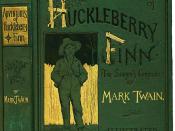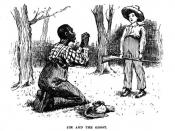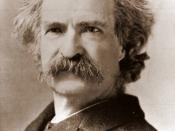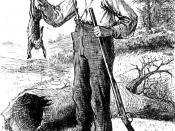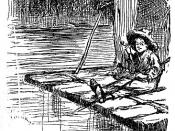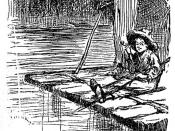Exploring Humor (with emphasis on satire) Ryan Long Period 3 Humor is a very impalpable subject. This is mainly because humor can be defined by example very differently by different people. While one person may find something incredibly humorous, another may find it boring, sad, angering, or sometimes disgustingly out of place. This is what makes defining humor such a feat. Beyond defining humor, writing it is an even more daunting task. Writing humor opens the writer to criticism of their morals and beliefs by how they use humor in writing. Mark Twain?s work, The Adventures of Huckleberry Finn, is a prime example of criticized humor in literature. Twain is criticized for his liberal use of satire in the novel, which scrutinizes American Midwestern society in his day. He aims his satirical weapons on such things as racism, religion, and accepted social behavior. Many of Twain?s ideas may be falsely interpreted when only glimpsed upon, which is why it is important that The Adventures of Huckleberry Finn must be carefully interpreted to reveal Twain?s true satirical goals in the novel.
The first page of the novel begins with Huck speaking of how the Widow Douglas has taken him in. ?The Widow Douglas, she took me for her son, and allowed she would sivilize me??(pg. 1). Page two goes on to explain how the Widow Douglas teaches Huck about Moses and the bible, however Huck is not interested after he finds Moses is no longer alive. In the following pages, Twain makes it very clear that the Widow Douglas has ?niggers? on her farm. This is one of Twain?s early satires that deal with racism and acceptable civilization. Twain uses situational irony by making the Widow believe strongly in Christianity, which preaches equality for all believers, while she suppresses blacks in her own home. In all of her teachings, the Widow neglects to ever mention equality of people to Huck. Twain?s unsparing use of racial satire shows up again on page 258. This is a conversation between Huck, who is pretending to be Tom Sawyer, and Aunt Sally. Huck is asked why he was so late arriving to the house by Sally and quickly makes up a lie about the boat blowing a cylinder. Sally asks, ?Good gracious! Anybody hurt?? ?No?m. Killed a nigger? Huck replies. To this Sally is relieved saying, ?Well, it?s lucky; because sometimes people do get hurt?(pg. 258). This is Twain?s attempt at humor by shocking the reader with situational irony. The uncaring tone of this passage is Twain?s way of showing how what were thought to be civilized people were very suppressive of blacks.
The liberal use of the word ?nigger? throughout the novel and examples from above could be quickly interpreted as the racism of the author showing through in the novel. That is why satire must be carefully interpreted as to not miss the satirist?s intent. Twain?s intent was not to hold up racism but to rather condone it through his persuasive use of situational irony and the up front cold and grim tone towards blacks shown by what were supposed to be civilized people. Twain?s main character, Huck, is one of the few who can see past skin color in the book when he is with Jim. In this point, Huck?s character flaws only increase the potency of satire against these so-called civilized people. Huck was an uneducated, compulsive lying, runaway who could see more in equality than people who were thought to be high society. It was Twain?s intent to use humor to show that oftentimes society is wrong in their views.
Twain also uses humor in other places. Twain shows humor in the innocence of childhood many times when readers travel with Huck down the river. This humor is seen in Huck?s trifles with religion. He debates the subject throughout the book. He can not decide if there is truth in religion, or if it is worthless. Early in the book he decides not to care about Moses because he is dead (pg. 2). Later, on page 45, he decides that prayer might make sense because he found some bread and concluded that the Widow probably prayed for him to find it. He simply decides that prayer only works for certain people. He continues to battle with the thought of prayer throughout the book when he decides that freeing Jim will send him to hell and decides to do it regardless. Other points of childhood innocence are shown when Huck and Jim decide what vegetables and fruits they can take and which ones they won?t take so they will not be in the wrong. When Huck and Jim meet the ?Duke? and ?King? they also show their gullibility when it comes to believing people. They at first actually believed that they were in the presence of a real Duke and King. Huck, however, does decide that they are lying but decides not to do anything about it to avoid confrontation. All of these points show Twain?s use of humor throughout the book as Huck and Jim travel the river.
Mark Twain presents Jim as a character that is both caring and loyal to his friend Huck. There are times when Jim seems to be a caricature of an uneducated black boy, but he risks many things for his friend Huck. Twain instead made Jim a very important part in the moral of the book. In this sense, Jim does not fit the mold for a caricature created by Twain but more of a grip that Jim is as human as Huck.
There were times when Twain seemed to be attempting humor in the novel that may have come short for many readers. When Twain was describing Emmeline Grangerford?s death (pg. 119-123) it seemed as though he was attempting at humor. It also seemed that many readers would not have found this funny because of the circumstance. This is a prime example of where humor is very different depending on the reader. Some might have looked past the grave circumstances and found humor in Twain?s passages while others might be disgusted that he would try to diminish a terrible thing with laughter. This again is why humor is hard to characterize.
Throughout The Adventures of Huckleberry Finn, as well as many other things in life, it is found that humor is very different for different people. There will always be people to laugh at everything remotely humorous, as well as people that seem to never laugh. Personal viewpoints rather than a single definition must specifically define humor. There are different goals a writer has when using humor, but they are all centered around a major influence, which is amusement. Twain used his humor to point out things in society that he believed were upside down, but without amusement and entertainment his works would have not gotten his views out to the world. As a broad definition of humor, it is everything that amuses you with laughter whether expressed physically or mentally. Humor is fun. Humor is functional as a way to express yourself. Laugh it up.
